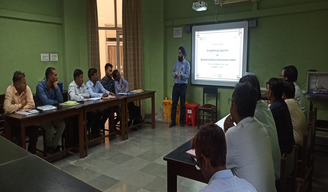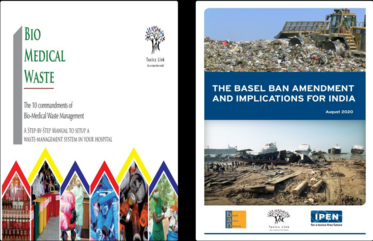INTERVENTION
Toxics Link has conducted extensive research on plastic waste issues ranging from single-use plastics, WEEE plastics to microplastics. We have been involved in several grassroots and advocacy campaigns in the country regarding plastic waste and its management.
Single-use plastic: Single Use Plastic (SUP), often referred to as disposable plastic, is manufactured with the aim of being used only once before disposing or recycling. With only 9% of plastic being recycled globally, single-use plastic with its short product life, adds a sizeable amount to the already mounting plastic waste. SUP has been identified globally as one of the key contributors to marine pollution and one of the most found items in global beach clean-ups. SUPs accounts for 60-95% of marine litter. This non-biodegradable waste persists in the environment and has many ecological, economic, health and social impacts. Single-Use Plastic bags are also one of the largest secondary sources of Microplastics in the ocean as they break up very easily under the action of sun and sea water.
A sudden increase in single-use plastic usage has been observed in the recent years in India, owing to change in consumer behaviour. With online delivery of essentials and food becoming a norm, the waste stream is filled with packaging waste which includes boxes, straws, wrappers and cutlery- all pretty much single-use plastic. This waste is many a times of low quality or multi-layered and cannot be recycled, or is in actuality downcycled.
In the current scenario, Toxics Link feels the need to create awareness among various stakeholders through its research and sustained campaign on SUPs. The focus is not just on pushing for efficient waste management of SUP, but also restriction and reduction in its usage. In one of the first reports on single- use plastics in India, “Single Use Plastic: The Last Straw”,( click here for report )Toxics Link has highlighted the current concerns. The report documents consumer behaviour, informal sector recycling, its impacts and current regulations on single-use plastic globally and also highlights the possible alternatives and good practices.
Microplastics:The challenge of removing plastics from Nature gets bigger and beyond the control of even plastic waste management because of ‘Microplastics’. Microplastics are up to 5 mm in size, water insoluble and non-biodegradable plastic particles produced secondarily from plastic products or used as a primary raw material in many products. They essentially contaminate the water resources, intrude into the aquatic food chain and reach into our daily intake through food or water. They remain uncaptured by most of the current filtration systems. They are too small to be removed from the aquatic environment as that would lead to the removal of all micro-sized aquatic plants and animals. Gigantic in their impact, these tiny little plastics are a permanent challenge for humankind.
Toxics Link has started working on microplastics recently with a focus on their primary sources, contaminations and destination routes in India. In a first-of-its-kind study in India, our report on ‘Personal Eco Care Products: Microplastics in cosmetics’ looks for the presence of primary microplastics in personal care and cosmetic products from the Indian market and a significant percentage of branded cosmetic products were found to contain microplastics (Click here for the report). A quick guide on microplastics with basic information has also been published (Factsheet on Microplastics).
WEEE plastic waste: Though India has separate rules for plastic waste and E-waste management but the plastic part of electronic and electrical waste was never addressed separately under any regulation. Plastics of e-waste come with their own set of risks which include hazards of their chemical contaminants and contamination in the material supply chain due to their informal recycling. Our reports on ‘WEEE Plastic and Brominated Flame Retardants: A report on WEEE plastic recycling’ (Click here for the report) and ‘Improving Plastic Management in Delhi: A report on WEEE plastic recycling (2014) (Click here for the report) shed light on the situation of WEEE plastic recycling in Delhi, the informal sector market and economics as well as the case of the formal sector.
Impact assessment of the plastic carry bag restrictions and ban notifications post the Plastic Waste Management Rules, 2011, was carried out in Chandigarh, Sikkim and Delhi in 2011 (Full report) and in Kolkata in 2015 (Kolkata report).






